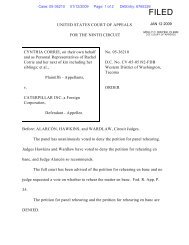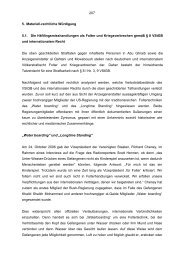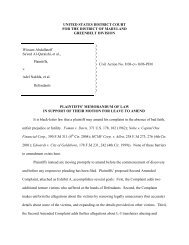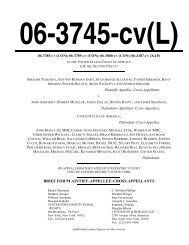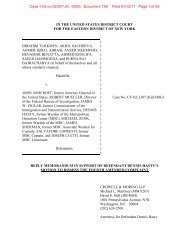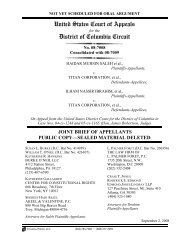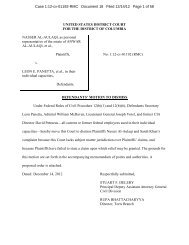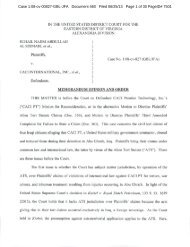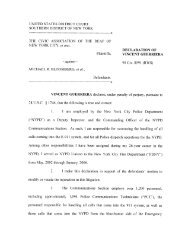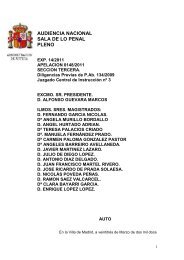Comments by the NYU Brennan Center and Former Corrections ...
Comments by the NYU Brennan Center and Former Corrections ...
Comments by the NYU Brennan Center and Former Corrections ...
Create successful ePaper yourself
Turn your PDF publications into a flip-book with our unique Google optimized e-Paper software.
<strong>Comments</strong> Submitted <strong>by</strong> <strong>Former</strong> <strong>Corrections</strong> Officers<br />
THE EFFECT OF EXCESSIVE RESTRICTIONS ON COMMUNICATION<br />
BOP should avoid overbroad restrictions on communications between inmates<br />
<strong>and</strong> family members. While imprisonment does not deprive a prisoner of all<br />
constitutional entitlements, it permits greater restriction of inmates’ constitutional<br />
rights than <strong>the</strong> rights of people who are not incarcerated. Consequently, <strong>the</strong> dangers<br />
that particular inmates pose sometimes require corrections officials to restrict those<br />
inmates’ communications as necessary to maintain safety <strong>and</strong> order. At <strong>the</strong> same<br />
time, overly harsh restrictions on communications can undermine prison order, cause<br />
higher rates of recidivism, <strong>and</strong> exact a high cost on inmates <strong>and</strong> <strong>the</strong>ir families.<br />
Cutting off communication between inmates <strong>and</strong> <strong>the</strong>ir families makes our<br />
streets <strong>and</strong> our prisons less safe. Time <strong>and</strong> again, empirical research has shown that<br />
inmates who maintain strong connections with <strong>the</strong>ir families are less likely to make<br />
criminal activity a way of life. “Inmates who maintain family ties are less likely to<br />
accept norms <strong>and</strong> behavior patterns of hardened criminals <strong>and</strong> become part of a<br />
prison subculture.” 4 As a result, preserving lines of communication between inmates<br />
<strong>and</strong> family promotes order <strong>and</strong> security in prison. The positive effects of family<br />
connections also continue after release from prison: “With remarkable consistency,<br />
studies have shown that family contact during incarceration is associated with lower<br />
recidivism rates.” 5<br />
Severe restrictions on communication also take a harsh toll on inmates <strong>and</strong><br />
<strong>the</strong>ir families. More than half of inmates in American prisons have children, <strong>and</strong> 80%<br />
of those parents stay in touch with <strong>the</strong>ir children while incarcerated. 6 Blocking<br />
communication increases <strong>the</strong> pain that spouses, children, <strong>and</strong> parents feel when <strong>the</strong>y<br />
lose a member of <strong>the</strong>ir family to <strong>the</strong> penal system. Letters, visits, <strong>and</strong> telephone calls<br />
create a lifeline between inmates <strong>and</strong> <strong>the</strong>ir families.<br />
4 Shirley R. Klein et al., Inmate Family Functioning, 46 INT’L J. OF OFFENDER<br />
THERAPY AND COMP. CRIMINOLOGY 95, 99 (2002) (citations omitted).<br />
5<br />
Nancy G. La Vinge, et al., Examining <strong>the</strong> Effect of Incarceration <strong>and</strong> In-Prison<br />
Family Contact on Prisoners’ Family Relationships, 21 J. OF CONTEMP. CRIM. JUST.<br />
314, 316 (2005) (citations omitted); see also Rebecca L. Naser & Christy A. Visher,<br />
Family Members Experiences with Incarceration <strong>and</strong> Reentry, 7 W. CRIMINOLOGY<br />
REV. 20, 21 (2006) (“[A] remarkably consistent association has been found between<br />
family contact during incarceration <strong>and</strong> lower recidivism rates.”) (citations omitted).<br />
6<br />
Nasser & Visher, supra n.5 at 20-21.<br />
4



